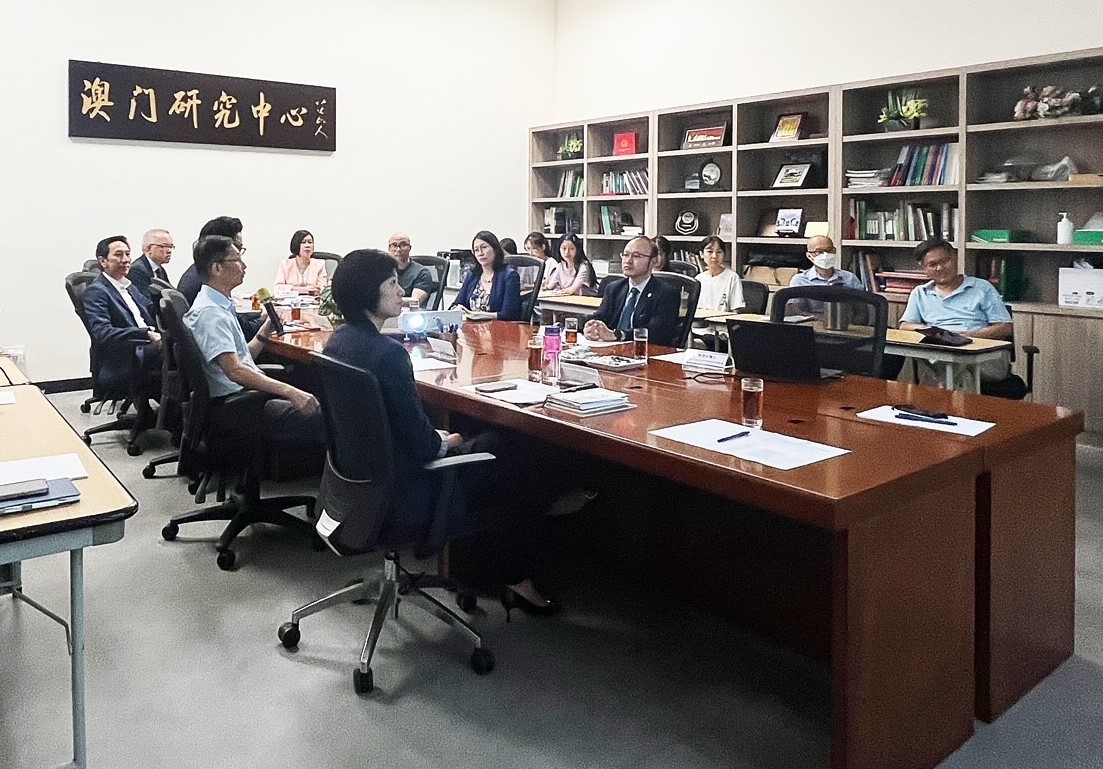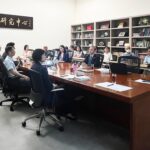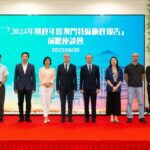 The seminar on the Macao SAR government’s policy address for the fiscal year 2024
The seminar on the Macao SAR government’s policy address for the fiscal year 2024
The University of Macau (UM) Centre for Macau Studies (CMS) today (30 August) held a seminar on the Macao SAR government’s policy address for the fiscal year 2024, in which experts and scholars provided suggestions for the government’s policies in the next fiscal year. During the event, the attendees discussed residents’ expectations in the midst of the economic recovery, the post-pandemic situation of micro and small enterprises (MSEs), as well as the transformation of occupational structure and the problem of unemployment caused by the development of artificial intelligence. They also proposed some forward-looking policies and suggestions for industries in various aspects.
The seminar was chaired by CMS Director Agnes Lam Iok Fong. According to Kwan Fung, assistant professor in the Faculty of Social Sciences at UM, the SAR government should continue to focus on ‘conclusion’ and ‘stability’ in its future policies. He suggested that the government should review the effectiveness of the beneficial measures introduced in the past three years, such as the electronic consumption benefits plan, financial support for small and medium enterprises (SME), and the subsidised training programme, in order to provide references for similar policies in the future. The government should also review the outcomes and shortcomings of the economy-boosting measures. Looking ahead, Macao’s tourism industry is expected to recover in 2024, and further efforts can be made to expand its international tourist sources, while the promotion of economic diversification should be based on stability.
Tong Kai Chung, president of the Macau Institute of Management, said that Macao’s economy is recovering, and has reached 71% of the level of 2019. However, as the tourism industry and tourist consumption are undergoing structural adjustments, the government should pay attention to structural disequilibrium in the process of economic recovery. In terms of governance, the government should place emphasis on maintaining consumption and investment confidence, and the beneficial measures taken during the epidemic should not be withdrawn from the market too quickly. He believes that with the integration into the Greater Bay Area and the increase in regional competition, the government should observe the relevant impacts on Macao’s MSEs, and help them to transition and survive in the course of economic restructuring.
Ricardo Siu Chi Sen, associate professor in the Faculty of Business Administration at UM, also shared the concern about the residents’ expectations towards the sudden rise in the number of tourists during Macao’s recovery period. He said that the government should take into consideration the residents’ expectations. To reduce the conflicts between residents and tourists, the government should also consider introducing measures such as encouraging the use of public transport, setting exclusive lanes for public transport, placing emphasis on environmental health, and implementing intelligent traffic diversion measures. He added that the government should give preliminary consideration to and prepare for the use of digital Renminbi in the future, and take legislative action on digital currency and mobile payment.
According to Davis Fong Ka Chio, director of the Institute for the Study of Commercial Gaming at UM, up to the present moment, the number of visitors to Macao has reached 14 million, and it is believed that the mass market will return to 2019’s level in the fourth quarter of this year. As the speed of recovery is faster than expected, some social issues may emerge. He pointed out that Macao’s ability to receive tourists is linked to its gaming revenue, which makes the gaming revenue predictable. The government can then make relevant estimates and formulate relevant policies accordingly. He noted that under the impact of high interest rates, MSEs’ liquidity is tight, and some MSEs that have participated in the scheme that allows them to pay the interest only with the suspension of the amortisation of capital might face closure or liquidity risks in the future.
Amy So Siu Ian, associate professor in the Faculty of Business Administration at UM, said that in terms of consoliding integrated tourism and leisure, the government needs to put more efforts in addressing the issues of transport support, and propose short-, medium-, and long-term improvement plans; in terms of cultural policy, it should develop ‘cultural landmarks’ with regard to customer experience and attractiveness; in terms of sports, culture, and tourism, in addition to focusing on the nature of events, it is suggested to consider the combination of events and tourism; in terms of conventions and exhibitions, it is suggested to strengthen the foreign language skills of Macao’s young people, which can contribute to the internationalisation of the convention and exhibition industry; in terms of cultural industries, it is suggested to pique the interest of local young people in emerging industries and familiarise them with the respective prospects; and in terms of the ‘Five-Year Plan’, the government should define the positioning of vaiours governmental departments in the Five-Year Plan.
According to Alfred Wong Seng Fat, associate professor in the Faculty of Science and Technology at UM, it is necessary to formulate short-, medium- and long-term technological development plans so as to foster an atmosphere conducive to entrepreneurship in the science and technology industry. The government should first develop technology industries and products that are easier to proceed with, and then develop those with higher levels and standards. Regarding the green industry, the government should strive to achieve the national target of peaking carbon dioxide emissions before 2030, introduce new technologies to create a green technology industry, and invest in the carbon trading market. In terms of Macao’s talent development plan, the government should actively cultivate and recruit talent with multiple skills, especially those with expertise in artificial intelligence and data science, and attract high-tech professionals who have successful experience. It should also support the sustainable development of local athletes. In addition, the government should be committed to implementing comprehensive urban planning in order to solve Macao’s traffic issues.
Chan Kin Sun, assistant professor in the Faculty of Social Sciences at UM, said that the government should increase efforts on promoting the four emerging industries so that residents can understand the correlation between the industries and the public. The government should know well about the ecology and industrial chain of the four industries, propose specific arrangements, and find the direction of future industrial development. As a key city in the western part of the Greater Bay Area, Macao can establish links with other cities in the region, which is conducive to the development of the city’s industrial chain. Moreover, he suggested that industrial platforms could be built to enable local MSEs to start their businesses and explore business opportunities in the region.
Elvo Sou Kuai Long, assistant professor (by courtesy) in the Faculty of Social Sciences at UM, shared his concern about the mental health of Macao residents, as the suicide rates in 2022 and the first half of 2023 are relatively high compared with previous years. Aside from boosting the economy, the government should also pay attention to the mental health of residents. He suggested that it should promote mental health courses in schools, optimise the allocation of mental health care resources in the public and private sectors, and advocate mental health policies in the market and workplace. He added that the government should focus on the continuity of policies and take follow-up actions in the future, for example, the issue of well-being mentioned in the Youth Indicators of Macao in 2021.



